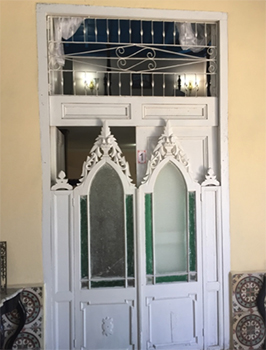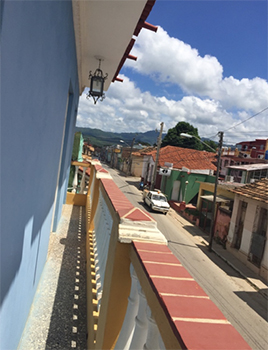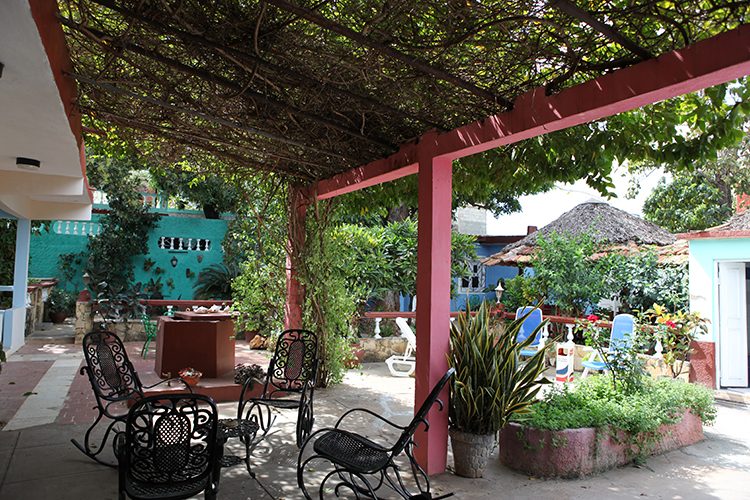Over the past 20 years, Cuban homeowners have been able to open their houses to visitors due to an increase in private enterprise within the nation’s developing economy. Trinidad, located on Cuba’s southern coast, is one of the most popular tourist destinations, attracting nearly a quarter of the island’s four million travelers in 2016.
In the first five months of 2017, Cuba received 2.2 million tourists, a 20% increase over the same period last year. With a new wave of inquisitive Americans arriving on the island, more and more hostels are popping up around the country and in Trinidad.

Casa Muñoz is nearly 200 years old and retains stunning features of antique Spanish colonial style. | Stacey Blansky
A hostel differs greatly from a hotel in that you live with a Cuban family, who in turn can teach you about the culture and history of your surroundings. They cost significantly less than hotels, ranging from 30-50 CUCs a night, which is equivalent to about $30-50. Some of these properties, also known as casas particulares, located in Trinidad include Casa Ida, Casa Muñoz and Hostel Barbaro & Andrea.
Many of the casas provide amenities such as breakfast, laundry services, Internet and salsa lessons. As the number of private houses open to foreign visitors within the town increases, owners are trying to provide more unique services to tourists, such as painting lessons and horseback riding.
Jordanki Pendoza, who runs an ornately decorated patio-style home, discussed why he chose to become involved with the bed-and-breakfast business at Casa Ida. He said that over 15 years ago, a friend of the property’s previous owner gave the house to Pendoza. Shortly thereafter, he chose to convert it into a business.
Pendoza explained that working at the casa presents a significant contribution to his income, which he uses to support his family, who also help out with running the terrace dining area. Because more and more tourists tend to research the most cost effective travel options which provide some insight into local life, hostels have become the preferred accommodation when visiting Cuba.
“Particularly for us, there is not much competition. We don’t need to worry about that because we work with many travel agencies,” Pendoza said. “But for the majority of the houses in town, they need to be competitive because they want to attract more tourists.”
Although there is an increase in the number of casas, the amount of business the properties receive is also increasing because more tourists are coming to visit Trinidad each year. Casa Ida features seven bedrooms as well as a tropical garden replete with a giant avocado tree and other exotic flora that surround the main patio.
“This casa is specifically nice because of the environment of the house. We pay a lot of attention to the clients here,” Pendoza said. “I like to work with the tourists because I can meet new people and speak to their cultures.”

Hostel Barbaro & Andrea has balconies that overlook the streets of Trinidad and offer a glimpse of the rural, mountainous region of the village. | Stacey Blansky.
Around the corner from Casa Ida is Hostel Barbaro & Andrea, a quaint building with glossy marble tile floor and a festive rooftop terrace. It has been open for about two and a half years and has been steadily receiving more visitors since then. One of the owners, Andrea Näf, explained that her husband had always wanted to run a casa, so when they came across the opportunity to open one, they fixed up their house and began welcoming tourists.
The increase in casas around town is not perceived by Näf as competition; instead she views the developing industry as a sign of Cuba’s burgeoning private economy. Barbaro and Andrea mostly receive travelers from Europe, specifically Germany, but she said that recently the number of American tourists has increased. She noted a discrepancy between her European and American customers concerning their general knowledge of Cuba.
“The Europeans know what they can expect from this country,” Näf said. “Americans, I guess they get a lot of wrong information about how bad it should be here. They are really happy when they see that you can go out and roam around freely. It’s just another normal country.”
Näf, among other casa owners, loves to meet people from other countries. Within these past couple of years that her house has been open to travelers, she and her husband have welcomed individuals from 51 different nations. Näf explained that she learns things from her guests that she never thought about before.
“You learn from them to see Trinidad with other eyes,” Näf said. “They see different things and ask things that you would never ask yourself about.”
On the other side of town is Casa Muñoz, a magnificent 200-year old building adorned with colonial furniture, decorative Spanish tiles and towering glass windows. Julio Muñoz, who mentors aspiring photographers with his psychological approach to camerawork, converted his home into a casa particular in 1998, when the government started legally allowing the privatization of property into rentable space.
Muñoz explained that casas in Trinidad receive excellent business from tourists because the city is so versatile. His casa particular does not need an agency because there are plenty of tourists looking to stay in town all year long. There is much to do and, because Trinidad is small, everything is within walking distance.
“Trinidad is one of the most important and unique destinations for tourists in Cuba,” Muñoz said. “It is the only city where you can have a combination of several things in nature to see, like mountains, waterfalls and farms.”
Muñoz said that running a casa is not simply a way to get income, but a way to make friends and learn about other people. He even learned about photography, his developing passion and career, from a group of photographers that stayed at his home. He believes that the direction his life takes is continually sculpted by the friendships he makes with his customers.
“It’s related to our way of life. For a long time, Cubans were isolated from the rest of the world because it was very difficult to travel here,” Muñoz said. “When people started to come from other countries, it gave us the possibility to learn about what is going on outside.”
Clearly, it is not only beneficial to your pocketbook if you stay at a casa particular in Trinidad, but also to the cultural awareness of your host and yourself. Being that these locals willingly open their houses to foreign guests, hostel owners are inherently sociable people. Living amongst a Cuban family will give you the exclusive opportunity to interact with and learn from the residents of this evolving island nation.
Hostel Ida. Calle Lino Pérez #170 e/ Frank País y Pedro Zerquera. Tel: (+53) 41 994007. arlettysgarcia@gmail.com. www.hostalida.trinidadhostales.com.
Hostel Casa Muñoz. Calle José Martí (Jesus Maria) #401, between Fidel Claro (Angarilla) and Santiago Escobar (Olvido) Tel: (+53) 41 993673. trinidadjulio@yahoo.com. www.trinidadphoto.com.
Hostel Barbaro & Andrea. Calle Frank Pais #261 between Colon and Antonio Guiteras. Tel: (+53) 41 994330. barbaroandrea@nauta.cu.
Travel Journalism, Photography & Video Internship Seminar in Havana and Trinidad, Cuba

